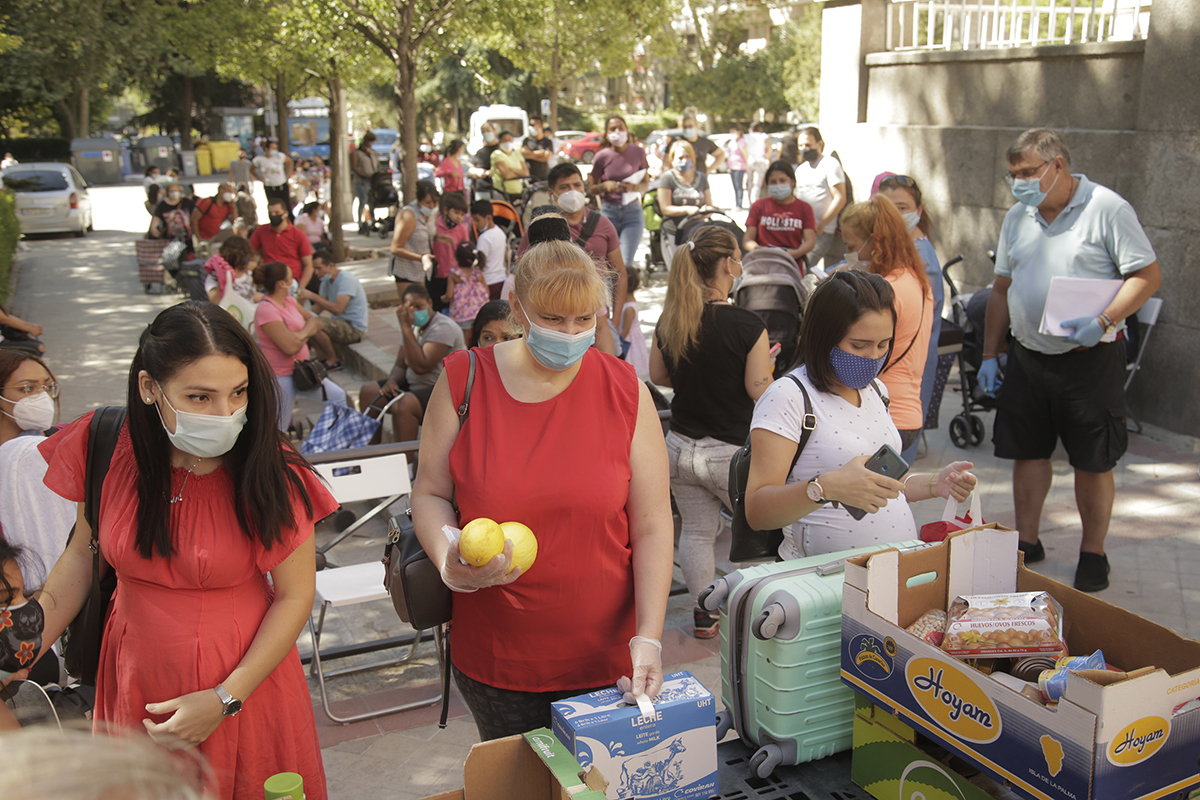Food insecurity and poverty have become persistent problems in Spain due to the consequences of the Covid-19 pandemic crisis and the economic impact it has had. The Spanish Government expanded the aid programs and launched measures such as the social shield and the increase in the IMV (Minimum Vital Income). However, the latest report by the Humans Rights Watch organization states that the “good intentions of the Government” ended in insufficient measures due to “the weaknesses and existing failures in the social security system.”
The organization points out in the report We cannot live like this: Spain’s inability to protect rights amid the increase in poverty caused by the pandemic that there are still many people who depend on non-governmental food aid and have to go to the “queues of hunger”, and affirms that the Executive “is not fulfilling its obligations to protect and fulfill the rights of people to food and to an adequate standard of living”.
Spain has already gone through a very hard time at a social level with the economic crisis of 2008, but the appearance of the coronavirus caused many people who were already living at risk of poverty to become even “more exposed to a total loss of income and lack of access to adequate nutrition,” the study notes.
Despite the ERTE and the implementation of the Minimum Vital Income -a subsidy that allows applicants to receive between 451 and 1,015 euros per month depending on the size of the household-, the platform points out that accessing aid is “extremely difficult due to strict eligibility and documentation criteria” and that some groups have been “disproportionately affected by the impact of the pandemic and the inadequate state response”.
On the other hand, it is recorded that during the epidemic the rights of people to food and an adequate standard of living were not protected, according to the conclusions reached by Human Rights Watch after having conducted interviews with the organizers of food banks in Madrid and Barcelona, autonomies on which the study has mainly focused.
The report concludes on this point that “there was uneven coverage depending on the region and the type of benefit” and that, in the first wave of office closures, “the fragility of the architecture of the social security system was exposed and its inability to deal with the arrears and demand of the IMV”.
Among a long list of recommendations, the organization states that the Government should take concrete measures to “enshrine in law the right to food, the rights of the child, the rights of the elderly and the right to an adequate standard of living” .
They also ask to eliminate bureaucratic barriers to access the Minimum Vital Income, in addition to making it more inclusive in periods of crisis or declared emergency and to investigate the high rate of rejection of requests for support for this benefit, since, despite efforts , the latest data from the Ministry of Inclusion and Social Security reflect that the IMV does not reach half of the households that were initially projected.
Given that the report has focused primarily on the communities of Madrid and Catalonia, Human Rights Watch believes that these autonomies should better coordinate with the government to ensure that delays in accessing essential social security support or increasing assistance are addressed. to people in vulnerable situations to access digitized application systems, among others.
Human Rights Watch denounces that the policies adopted by the government had a “negative and significant” impact on economic activity, because they pushed a new group of people into poverty and caused “an increase in food insecurity.” And that, despite the fact that measures were taken, they also contributed to exacerbating poverty, including that of older people who receive pensions, so that the result was a “deterioration in the enjoyment of economic and social rights of people “.
They state that the almost total economic closure caused by the confinement left many people who worked in key sectors of the Spanish economy, such as tourism, hospitality or entertainment, without income, so that there were families who went hungry and had to choose between lunch or dinner. Ana María Ametler, 42, says that during the pandemic, if she had something to eat, it was for her daughter. “She was satisfied with a coffee or a glass of milk,” she confesses in statements collected in the Human Rights Watch report.
The UN Committee on Economic, Social and Cultural Rights criticized in 2018 the insufficiency of contributory and non-contributory pensions related to age in Spain, considering them “insufficient” to guarantee pensioners and their dependents an adequate standard of living, for which asked the Government to restore the clear index between social security benefits and the cost of living.
According to Human Rights Watch, families have been disproportionately affected by the loss of income during the pandemic because Spain has a “complicated” system of subsidies and benefits. In addition, they point out that the child poverty rate in 2020 was the highest in Europe, according to the IMF (International Monetary Fund) study and, although the IMV represented an important paradigm shift, social support did not reach many families living in poverty because the support “was insufficient in itself”. Many families living on low incomes in Spanish cities share apartments, often without formal lease agreements, due to long-standing problems of insufficient social housing.
This study is the first in a series of investigations that Humans Rights Watch is conducting in Europe on people’s rights to an adequate standard of living, incorporating their rights to food and social security, including in the context of impact of Covid-19. As they conclude from the organization, the Spanish State “did not protect the rights of people to food and an adequate standard of living during the pandemic.”
Conforms to The Trust Project criteria
















